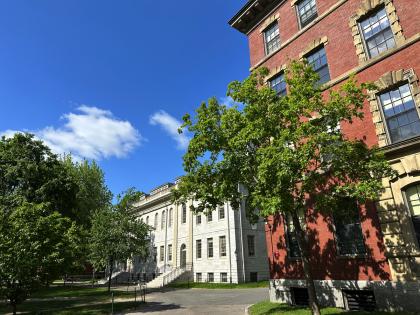Editor’s note: As an undergraduate, Thomas Pepper ’61 was a sports correspondent for the Harvard Alumni Bulletin, this magazine’s previous incarnation. Half a century later, as his fiftieth reunion approached, he wrote a different sort of article and forwarded it for our consideration. As Commencement and reunion week begins, we thank him for allowing us to share this excerpt from his class report entry with a wider audience.
Last autumn, as I began thinking ahead to this week's fiftieth class reunion and recalling what had been happening in the world during the past five decades, I was astounded by how much seemed to have been unexpected. Certainly the fall of communism, I thought, but what else? I then—unexpectedly—began writing the attached review, mostly to see if my perception was warranted.
Looking back at the 50-plus years since our class arrived in Cambridge, I happened upon the prominence of unexpected events. As the comedian Mel Brooks would say, “Who knew?”
To my eye, five unexpected events or developments during these years stand out:
- The election in 2008 of an African American, Barack Obama, as president of the United States, and associated changes in inter-racial perceptions and expectations both in the U.S. and throughout the world.
- The collapse of communism as an economic system, beginning in China in the late 1970s, and its replacement in the 1980s by market economy concepts; the associated dissolution in 1989 of East Germany and the Soviet Union as nation states, and the beginnings of a post-communist, primarily materialist, Chinese renaissance, via the unexpectedly rapid adoption of market-based systems and institutions.
- The invention and initial use of the Internet in the early 1990s and its subsequent impact on social and business structures worldwide through a decline in hierarchy as an organizing concept of everyday life.
- A decline in American military competence and reputation, in relation to the challenges entailed in dealing with hostile insurgencies and other political and so-called unconventional conflicts in and vis-à-vis non-Western societies.
- A threat of long-lasting, worldwide terrorism, following the spectacular attacks on September 11, 2001, by militant Islamists on landmark U.S. buildings and myriad smaller-scale and/or individual suicide bombings that continue on six continents.
The historical and global significance of President Obama’s election is apparent from even a brief look at the context in which it occurred.
In September 1957, as classmates and I were unpacking suitcases in freshman dorm rooms in the Yard, President Eisenhower was ordering the Arkansas National Guard into federal service with a mission to escort nine black students into Central High School in Little Rock, in support of Supreme Court rulings upholding petitions to end racial segregation in public schools. Anyone’s prediction then that some 50 years later the country would elect an African-American president would have seemed unlikely, even unimaginable.
On a trip to India in February 2009, I interpreted the many questions I was asked about President Obama—just after his inauguration, which had been televised in India—to mean he was being seen around the world as more than simply an American president; he was being seen as something like “crown prince” of the entire world, reflecting dreams of opportunity and equality among billions of non-white—and also white—peoples.
At the time of this writing, however (October 2010), President Obama is widely seen in the U.S. as a disappointing chief executive. Whether he can recover something like the high standing he had at home and abroad at the time of his election is, of course, an open question. Whatever the outcome of President Obama’s personal record in U.S. history, from my perspective, having grown up in a segregated environment in Georgia, it is heartening to note that the considerable criticism currently being leveled at Mr. Obama is directed primarily at his job performance rather than his racial ancestry(ies) or religious preferences and beliefs.
In this sense, the U.S. has changed fundamentally during the 50-plus years of our class’s association with Harvard. Without particular plan, Americans turn out to be sizing up their first African-American president mostly on the basis of the same criteria used for evaluating previous and other prospective presidents.
That the Soviet Union, the recognized founder of communist-led nation-states and a recognized great power among nations, could collapse from internal contradictions, and without stirring up full-fledged or long-lasting civil or international wars in the process, was more change than virtually anyone at the time expected, let alone hoped for.
After all, the very phrase “internal contradictions” is a Marxist concept meant to apply to capitalist societies. Mikhail Gorbachev, General Secretary of the Soviet Communist Party in the 1980s, developed the perestroika (openness) concept as a way to introduce market-oriented flexibility into Soviet management practices. But the latter proved impervious to change as long as a Communist/Leninist political structure dominated decision-making.
Meanwhile, whether for reasons of national character, or as a “rational” response to the self-destructive nihilism of the ten-year-long Cultural Revolution (1965-1975), Chinese communist leaders began questioning the effectiveness of then recently deceased Party Chairman Mao Zedong’s adherence to central planning as the key organizing concept of the Chinese economy. Beginning in 1978, a rehabilitated Deng Xiaoping, also a career Communist Party leader, assumed the position of “paramount leader” and with it the latitude to introduce market economy concepts into Chinese official and daily life. “Socialism with Chinese characteristics” was Deng’s poetic phrase designed to enable then-heretical ideas of a market economy to be adopted in practice, if not in theory.
In 1980, during a visit to China at the invitation of a Ministry of Defense think tank, our Hudson Institute delegation, led by Hudson founder Herman Kahn, was expected to explain how market economies work and, more urgently, how to make them work. I doubt anyone in the room, including ourselves, would confidently have been imagining that within 30 years China would so successfully enhance its economic performance that it would have become the world’s second largest economy—surpassing Japan, whose own development history we at Hudson had been describing and analyzing to widespread interest.
As with so many other innovations in history, the Internet is today taken for granted as if it always existed to facilitate communication across space, cultures, political boundaries, and everyday institutions—and do all this at nominal or no cost to users. This unusual state of affairs is about to change.
The Internet’s provision of instantaneous, confirmable communications across any distance on the planet has transformed everyday business and personal life, speeding up the pace of activities, widening their scope, and in turn reducing the previous seemingly important distinction between domestic and international activities. In contemporary language, the Internet enables down-to-earth globalization.
But like all instruments in mankind’s use, the Internet can be employed for constructive or destructive ends. The 9/11 suicide bombers used Internet-based communications for training and housekeeping support. The Indian government, citing its own experience of the “26/11” terrorist attack in Mumbai in November 2008, has begun using the threat of further terrorism as a rationale for demanding access to Internet service providers’ content stored on previously private servers. Meanwhile, as Internet capabilities increase, suppliers of Internet-based information delivery systems will likely try, more than they have to date, to incorporate development costs into selling prices. In other words, the “golden age” of inexpensive and politically neutral-to-friendly Internet availability is probably over.
Even with higher usage costs, the Internet’s most significant contribution to societies worldwide will likely continue to be the enabling and/or active promotion of direct communication between parties whose communications were previously channeled into hierarchies and made available only (or primarily) along pre-set, organizationally based lines. In principle, because of the proliferation of conveniently hand-held wireless and/or Internet-based communications devices, every individual is now potentially an independent entrepreneur requiring minimal capital outlays to begin functioning in an entrepreneurial way.
In terms of military weaponry and firepower, the U.S. is far and away the world’s leader. But this awesome destructive power is irrelevant to the primarily lower-tech political-military threats the U.S. faces from hostile insurgent forces.
The relevant combined political-military capabilities needed to contain, co-opt, or destroy hostile insurgent forces are now recognized among the highest U.S. military leaders as a primary requirement of organization and training, particularly for infantry units in the Army and Marine Corps.
Unfortunately, despite great efforts and personal dedication among the now all-volunteer U.S. forces and their civilian political and economic co-combatants, the difficulties that plagued U.S. attempts to develop effective political-military capabilities in Vietnam in the 1960s and 1970s continue to haunt comparable U.S. efforts to develop these capabilities for deployment in current conflicts in Iraq and Afghanistan.
Weaknesses in American forces’ knowledge of local languages, politics, culture, social structure, and religion, as well as a general American unfamiliarity with the early stages of economic development, often translate into a tendency for units in the field to turn to small-unit tactics and/or electronically guided air and missile attacks as a means of achieving temporary local superiority. Such efforts, even when seemingly successful, are insufficient to buttress American (and associated allied) efforts to achieve medium-to-long-term local political support and stability.
As of this writing, the outcome (or even the next phases) of current conflicts in Iraq and Afghanistan is unclear. From the perspective of local populations caught up in these conflicts and/or their fellow third-world onlookers, U.S. involvement in such conflicts brings an unappealing combination of (a) potentially devastating force unassociated with locally clear political purposes, and (b) a questionable history of a lack of staying power, the latter going back to Republican presidential candidate Dwight Eisenhower’s 1952 campaign statements implying a willingness to accept a cease-fire in Korea. From this perspective, President Obama’s comparable statements about wanting at some point “soon” to withdraw (or greatly reduce) U.S. forces in Iraq and Afghanistan have a precedent.
U.S. counterinsurgency aims are less in question than the U.S. ability effectively to wage counterinsurgency warfare. Americans evidently want to contain hostile insurgent forces, but haven’t shown yet that they know how.
The phenomenon of terrorism, in effect a “guerilla weapon for a guerilla movement,” has a recognized history. Technology gives terrorism a future, particularly via the ready availability to terrorist groups of remotely operated explosive detonation systems that enable individual terrorists to destroy their targets while avoiding self-destruction.
At the same time, terrorists willing to accept and conduct suicide bombing missions create threats that are extremely difficult to counter, stimulating defending parties to take extreme steps of their own, as noted above with regard to Indian government efforts to access previously private information stored in Internet-based servers. American and European governments are actively considering similar steps. (A noteworthy example from World War II of suicide-based escalation, generally classified as part of a military- rather than terrorist-based conflict, was the appearance of Japanese kamikaze bombing missions in 1944-1945, as American forces moved closer to the Japanese home islands. This fear-inspiring challenge to American military actions contributed part of the rationale for the U.S. decision to make use of its then-just-developed atomic bombs and to aim these then-unprecedentedly destructive weapons at inhabited target areas, i.e., the cities of Hiroshima and Nagasaki, rather than aiming at uninhabited sections of ocean waters in demonstration bomb exercises, as proposed by some scientists working on development of the bomb.)
Both organized insurgent military units and smaller-scale/individual terrorist cells depend on sanctuaries for shelter and sustenance. President Obama’s two “decision moments” on war policy in 2009 and 2010 were based on his concluding that Afghanistan’s potential use by Islamist Al-Qaeda groups as a sanctuary for training and perhaps even for missile launch sites represented a direct threat to the security of U.S. and allied nations. This led him, in turn, to support increased U.S.-led military efforts in Afghanistan (spilling over into parts of Pakistan).
Of the five unexpected events or developments of the past 50-plus years that are singled out and mentioned above, the first three—(1) the election of an African American as president of the U.S., (2) the collapse of communism, and (3) the invention and now widespread use of the Internet—either support U.S. national interests (as usually defined) or stem from generally accepted U.S. values. What is most unexpected about these three developments, which justify their standing out as worthy of mention, is the remarkable degree to which they have been accepted, adopted, and welcomed throughout the world. In this sense, overall U.S. strength is far from declining, and the unspoken support for American values that are an outgrowth of the Internet is far from declining.
Item four from the above-mentioned list—the decline in American military competence vis-a-vis hostile insurgent forces—does represent a major challenge for U.S. policy, and a challenge that leading figures in the U.S. government now acknowledge needs to be met with more success than has been achieved to date. The issue here, as also noted above, is not what to do but how to do it, i.e., how to develop reliably capable counter-insurgency forces that can prevail over forces hostile to the values and interests of the U.S. and associated countries. Item five—the continuing threat of terrorism worldwide—can be met successfully if and as terrorist aims lose their appeal among local groups whose support would otherwise be needed to organize and implement terrorist incidents.
Any effort to try to estimate the relative strengths of the first three items on the above list (which either support or stem from U.S. values) versus the last two items (which undermine or threaten to undermine U.S. values) has to deal with the inevitable difficulties associated with comparisons among incommensurables. Yet we can safely say that the first three items have greater scope than the last two.The breadth and depth of feelings associated with President Obama's position as the leading political figure in the world—plus the steadily evolving capabilities of the Internet—turn concerns at home and abroad about the adequacy of U.S. military capabilities into a technical footnote, with concurrent fears of random acts of terrorism reduced to the equivalent of a sub-footnote. As long as the United States maintains its unequaled openness both internally (in social structure) and externally (in relations with other peoples and countries), it will likely continue to meet the challenges it faces with further and continuing revitalization.







